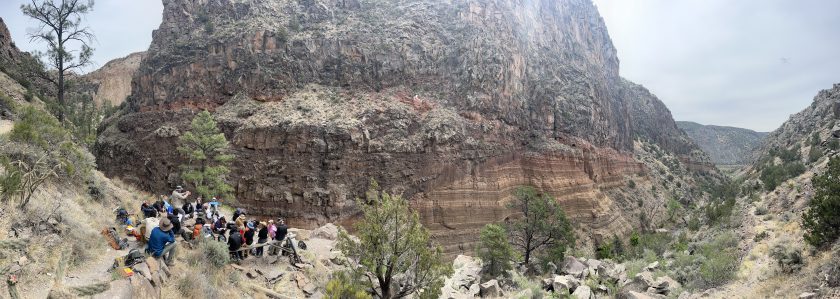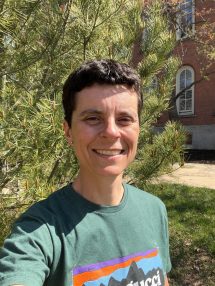Jackson School Enters a New Era of Field Camp
December 12, 2023

Change is coming to GEO 660, the foundational summer geology field camp of the Jackson School of Geosciences.
Starting next year, the camp will run on a three-week schedule instead of the six weeks of years past. Leading GEO 660 will be a new field camp director, Miriam Barquero-Molina.

The three-week schedule will enable students to spread out their field camp experience into two trips, said Danny Stockli, the chair of the Jackson School’s Department of Earth and Planetary Sciences, with field visits being split up across two field camp sections — GEO 660A, aimed at sophomores, and GEO 660B, for students at the end of their junior year.
In addition to helping students build and improve on their field skills during their college careers, Stockli said that it should get students into the field sooner. Because of the six-week field camp’s time commitment, many students delayed taking field camp until their final year in college or even the summer after graduation. This situation often led to a big gap in time between students taking field methods, which is frequently taken early in college, and getting to apply those skills.
“We want a field camp experience that is less trial by fire,” Stockli said. “We want students to have the opportunity to grow and develop from one trip to the next.”
The field camp will still take students to visit sites in West Texas, New Mexico, Utah and other locations across the country.
The camp will occur in May, the same time as the Jackson School’s two other field camps, hydrogeology and marine geology and geophysics. The new timing has the added benefit of occurring during the UT “Maymester” schedule, which enables summer field camp tuition to be covered by spring tuition at no additional cost to students. Funding from Jackson School endowments previously covered field camp tuition for all students. Now, this funding can be applied elsewhere to other aspects of the field camp experience, such as field technology.
The timing also offers students more flexibility, Stockli said. A three- week course in May leaves most of the summer free so students can attend to other things, whether that’s internships or summer jobs, or personal or family obligations.
“I think this flexibility is a major benefit, a quantum leap forward in terms of inclusivity,” Stockli said. “Students are done at the end of May, so they can go do that internship, or take that summer job that they need, or take care of their children if they have them.”
Charlie Kerans, a professor in the department, led this year’s GEO 660 field camp as interim director, filling the space left by the camp’s former director, Mark Helper, who retired from the Jackson School last fall.
Next year, Barquero-Molina will take the reins as the new director of field camp. Barquero-Molina earned a doctorate from the Jackson School in 2009 and helped lead the school’s field camp during graduate school.
“It’s a coming home of sorts for me,” she said. “The Jackson School has always felt like home because during a critical stage of my life it was my scientific home, and I feel pride and joy to be a part of it again.”
Previously, Barquero-Molina was field camp director and associate teaching professor at the University of Missouri, where she led Camp Branson, the university’s six-week field camp in Lander, Wyoming, for 13 years. In 2014, Barquero-Molina was recognized by the Geological Society of America with the GSA/Exxon Mobil Field Camp Excellence award.
